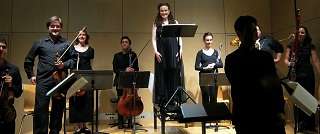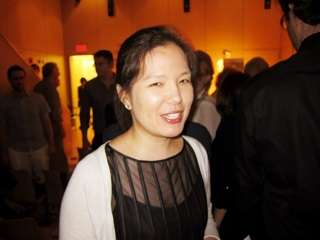|
Back
Fragments of an Apocalyptic Poet New York
Austrian Cultural Forum
07/02/2013 -
Georg Friedrich Haas Welcome Concert
Alban Berg: Adagio, from Kammerkonzert (arranged for quintet by Michel Galante)
Arnold Schoenberg: Sechs kleine Stücke, Opus 19
Anton Webern: Drei Stücke, Opus 11
Georg Friedrich Haas: ATTHIS, for soprano and octet (US Premiere)
Sharon Hams (Soprano)
Argento Chamber Ensemble: Emi Fergeson (Flute), Carol McGonnell (Clarinet), Gina Cuffari (Bassoon), William De Vos (Horn), Joanna Chao, Conor Hanick (Pianos), Cyrus Beroukhim, AaronBoyd (Violins), Stephanie Griffin (Viola), Jay Campbell, John Popham (Cellos), Brian Ellingsen (Bass), Michel Galante (Conductor)

Argento Ensemble, S. Hams (Center) (© Coco T. Dog)
Like a tragic actor in Pericles’ Greece standing on two-foot-high shoes, soprano Sharon Hams ascended a two-foot-high platform, stood above the eight members of the Argento Chamber Ensemble and conductor Michel Galante, sang, chanted, cantillated and burst forth with glass-breaking high notes through the fragments of Sappho.
This, the American premiere of Georg Friedrich Haas’ ATTHIS, was part of the Austrian Cultural Forum “Welcome” to the composer for his appointment to teaching at Columbia University. But truth be told, every concert with Mr. Haas’s productions is a welcome to a new sound, a new audacity, music which reaches the extremes. Not the extremes of technical atonal dexterity, forcing us to use our cerebral vertices. But the extremes of emotional clarity, attempts to reach the furthest reaches of our mind.
He does this through darkness, through loudness and softness, through making us see orchestral colors in the darkest shadows or the most shattering sunlit flares. And in this 45-minute tapestry–yes, an ancient tapestry going from wall to wall of aural significance–he again shattered our minds.
The color in this, a rewritten version of a work he wrote four years ago, divides the octet into two orchestral fields. A string quartet was on the left side. Their work reached the highest dimensions, they played and shivered and gave their instruments massive sounds which reached as high and as soaring a sound as possible. Yet no notes were what the seemed. The tones were about one-sixteenth apart, the glissandi moved into dynamic extremes, into harmonic overtones, shaking back and forth in their voices, keeping us on edge.
The other side were three basses: the double-bass, bassoon and French horn. Nothing was subtle from these players. Their sounds reached to the bottom (I thought that bassoonist Gina Cuffari was playing a contra at times, and that horn-player William De Vos was playing two or three Wagner tubas simultaneously).

G. F. Haas, J. Campbell (© Coco T. Dog)
Right in the middle, behind the Argento’s dynamic conductor Michel Galante was soprano Hams who took the Sapphic poems–and oh, how I wish I could have read them before the concert, though none were printed–and ran them through the most unusual voices.
She could be almost crude at times, she was melodic, she rose to the highest pitches above high C. Frequently, the instruments were playing emotional dynamics apart from her poetry. Just as frequently, one felt that the strings and the bass notes were undermining or harmonizing with her.
Yet Mr. Haas did not need to revel in dissonance. The piece actually started with Nineteenth Century harmonies. We could have been listening to the opening of The Ring with vernal sounds that only gradually turned into this picture of both desolation and love. (He also mentioned quoting from Schubert’s Octet, but, mea culpa, I didn’t spot it.)
Could one keep up with all 45 minutes? I tried, and during the middle, the mind wandered. This was my shortcoming, not that of Mr. Haas. In this splendid epic piece, he took the desolation of Sappho, the torment, the passion and turned it into a passionate, agonizing work. Throughout, one felt one was not listening to a master composer, but a dramatist à la Antonin Artaud, transubstantiating the sounds of words into sacraments of glory.

J. Chao (© Coco T. Dog)
The work by Mr. Haas was a mesmerizing 45 minutes, and his question-and-answer dialogue (all too brief) took a bit more time. But this was hardly the whole program. While not a kosher dodecaphonist, Mr. Haas’s Austrian roots were celebrated with three works by the three parents of the atonal movement.
Joanna Chao had two major efforts. As a soloist, she played the Schoenberg Six Little Pieces with translucence. At times these works call for the sense of a breathless magical idea, and while the magic was missing, the works had that sense of a single idea.
She was equally at home in the Adagio from Alban Berg’s Chamber Concerto, arranged by Michel Galante for violin (the more than apt Aaron Boyd), flute and clarinet. Berg’s original is an amalgam of the cryptic (those notes standing for various composers), the lyrical and the psychological. Mr. Galante, by eliminating most of the 13 original instruments gave it greater transparency, but more important he showed exactly how operatic the violin part was here. In fact, until the middle section of the movement, this Mr. Boyd’s violin played the coloratura soprano, frequently almost Italianate (though more frequently Wozzeckian). The work is such a graceful one in its entirety, I would love to see Mr. Galante attempt the entire half-hour piece.
Before the intermission, cellist Jay Campbell and pianist Conor Hanick played Webern’s three cello pieces. Much as I would like to comment, I am not a cellist, and the pieces were like split atoms a few decades before Einstein managed the same thing. I assume, though, that he played the Webern with emotional alacrity.
Still, one expects nothing less of Argento Chamber Ensemble musicians than perfection, challenge and excitement. The afternoon (and presumably yesterday evening) belonged, though, to Georg Friedrich Haas. His works have been influenced by the most profound idea, thoughts, and ancient wisdom. One wonders what influence his tenure in New York will have on this great artist’s splendid creations.
Harry Rolnick
|